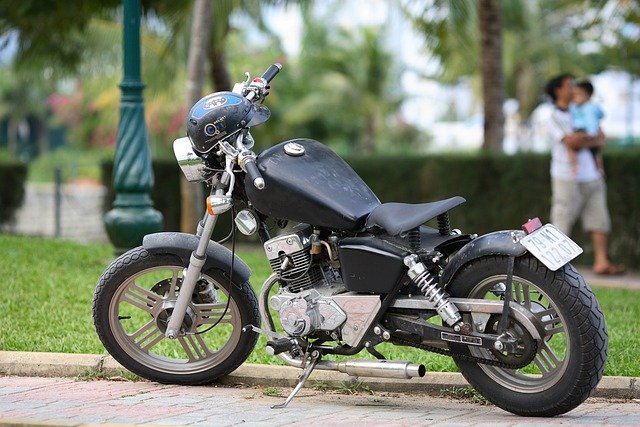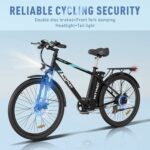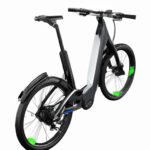
So you’re thinking about riding your e-bike in traffic? That’s great! E-bikes are a convenient and eco-friendly mode of transportation, but it’s important to prioritize your safety on the road. In this article, we will discuss the safety precautions you should take when riding an e-bike in traffic to ensure a smooth and secure ride. From wearing the right protective gear to understanding traffic rules, we’ve got you covered. So keep reading to learn more and ride safely!
If you want to ride your e-bike in traffic, it’s essential to be aware of the safety precautions you need to take. This means equipping yourself with the proper safety gear such as a helmet and reflective clothing to enhance your visibility. Additionally, understanding traffic rules and signals, as well as practicing defensive riding techniques, can go a long way in ensuring your safety on the road. We’ll also delve into the importance of regular maintenance for your e-bike and provide tips on how to interact with other road users. So if you’re ready to hit the road on your e-bike, stay tuned for valuable insights on riding safely in traffic! Riding an e-bike in traffic can be a convenient and eco-friendly way to get around. However, it’s important to prioritize safety and take the necessary precautions to protect yourself and others on the road. In this article, we will discuss some essential safety measures you should follow when riding an e-bike in traffic.
Wear Protective Gear
Importance of wearing a helmet
Wearing a helmet is crucial for your safety when riding an e-bike in traffic. It protects your head in case of a fall or collision, significantly reducing the risk of head injuries. Even if you’re riding at a relatively low speed, accidents can happen, and a helmet can make a world of difference in preventing serious injuries.
Choosing the right helmet
When selecting a helmet, make sure it meets safety standards and fits properly. Look for helmets that are certified by organizations like the Consumer Product Safety Commission (CPSC) or the European Committee for Standardization (CE). Additionally, ensure that the helmet covers the entire head and has a secure chin strap for a snug fit.
Wearing other protective gear
While a helmet is essential, wearing additional protective gear can further enhance your safety. Consider wearing elbow and knee pads to protect your joints in case of a fall. Additionally, wearing gloves can provide a better grip on the handlebars and protect your hands in case of an accident.
Know Traffic Laws and Regulations
Understanding local traffic rules
Before hitting the road, familiarize yourself with the local traffic laws and regulations. Each jurisdiction may have specific rules and guidelines for e-bikes. It is essential to know where you are allowed to ride and what traffic rules apply to e-bike riders. Understanding these laws will help you navigate safely and avoid any legal issues.
Following speed limits and signals
Just like any other vehicle on the road, you should adhere to the posted speed limits. Excessive speed can compromise your control over the e-bike and increase the risk of accidents. Additionally, obey traffic signals and signs to ensure your safety and maintain a smooth flow of traffic.
Yielding to pedestrians and vehicles
Always yield to pedestrians and vehicles when necessary. As a responsible e-bike rider, it’s crucial to be aware of your surroundings and give way when required. This includes crosswalks, intersections, and bus stops. Respecting other road users will contribute to a safer and harmonious traffic environment.

Maintain Proper Visibility
Using lights and reflectors
To enhance your visibility, equip your e-bike with proper lights and reflectors. Install a white front light and a red rear light, both of which should be visible from a distance. Reflective strips on your bike, helmet, and clothing can also increase visibility, especially during low-light conditions.
Wearing bright and reflective clothing
When riding in traffic, it’s important to make yourself visible to other road users. Wear brightly colored or reflective clothing to stand out during the day and night. This will make it easier for motorists and pedestrians to spot you from a distance and react accordingly.
Avoiding blind spots
Avoid riding in blind spots of vehicles, especially large trucks and buses. Riding too close to these vehicles can put you in a dangerous position where the driver may not see you. Stay far enough behind or move ahead to ensure that you are visible in their mirrors and have enough space to maneuver safely.
Be Mindful of Road Conditions
Checking road conditions before riding
Before setting off on your e-bike, check the road conditions. Look out for any road hazards, such as debris, potholes, or construction zones. Being aware of the road conditions allows you to adjust your speed and route accordingly, avoiding potential accidents.
Avoiding uneven surfaces and potholes
Unstable surfaces like uneven pavement, gravel, or potholes can pose a significant risk to e-bike riders. These surfaces can cause loss of control and lead to accidents or falls. Scan the road ahead and choose the smoothest path possible to ensure a stable and safe ride.
Awareness of gravel, wet leaves, and other hazards
Certain road hazards, such as gravel, wet leaves, or oil spills, can reduce traction and increase the likelihood of skidding or losing control. Stay alert and cautious when encountering these hazards, as they can be especially dangerous when riding an e-bike. Adjust your speed and avoid sudden braking or turning to maintain stability.

Signal and Communicate Clearly
Using hand signals for turning and stopping
Communicate your intentions to other road users by using hand signals for turning and stopping. Extend your left arm straight out to indicate a left turn, bend your left arm upwards at the elbow to signal a right turn, and hold your left arm down with the palm facing backward to indicate stopping or slowing down. These signals will help motorists and pedestrians understand your next move and anticipate your actions.
Making eye contact with drivers
When interacting with other drivers at intersections or during lane changes, try to make eye contact to ensure they see you. Eye contact can help establish a clear line of communication and reduce the chances of misunderstandings or collisions. If you’re uncertain whether a driver has seen you, it’s best to wait and proceed with caution.
Using a bell or horn when necessary
Equip your e-bike with a bell or horn to alert others of your presence when needed. Use it to signal your approach to pedestrians or give a gentle reminder to inattentive drivers. However, use these auditory signals sparingly and considerately, as excessive use can startle or annoy others.
Maintain a Safe Distance
Keeping a safe distance from vehicles
Maintain a safe distance from vehicles in front of you, especially in heavy traffic. This allows you ample time to react to sudden stops or turns. The recommended safe following distance is at least three seconds, which gives you enough time to stop or change lanes if needed.
Avoiding riding in blind spots
When riding alongside larger vehicles, avoid lingering in their blind spots. A truck or bus driver may have difficulty seeing you in certain areas, such as directly behind or beside them. Stay visible by positioning yourself slightly ahead or behind the blind spot, making it easier for the driver to spot you in their mirrors.
Maintaining buffer zones
Creating buffer zones around your e-bike helps provide an extra layer of safety. Leave enough space between your e-bike and parked cars, other cyclists, and pedestrians. This provides a cushion for unexpected movements and reduces the risk of collisions. Pay attention to the actions of others and adjust your speed or position accordingly.

Stay Alert and Focused
Avoid distractions like phone usage
When riding in traffic, it’s crucial to stay focused and avoid distractions. Using your phone, listening to music with earphones, or engaging in other distracting activities can divert your attention from the road ahead. Keep your phone in your bag or pocket and prioritize your safety over any distractions.
Being aware of surroundings
Maintain awareness of your surroundings at all times. Scan the road ahead for potential hazards, monitor the movements of other road users, and anticipate potential conflicts. Being proactive and alert allows you to react quickly and make informed decisions, minimizing the chances of accidents.
Anticipating and reacting to potential hazards
Traffic situations can change rapidly, so it’s important to anticipate and react to potential hazards accordingly. Stay focused on the road ahead, watch for sudden movements from other road users, and be prepared to take evasive action if necessary. Maintaining a defensive riding mindset will help you navigate through traffic safely.
Ride Predictably and Confidently
Maintaining a steady speed
Ride at a steady speed that is appropriate for the road conditions. Sudden changes in speed can surprise other road users and increase the chances of accidents. Avoid excessive acceleration or deceleration and maintain a consistent and predictable speed that allows other vehicles to anticipate your movements.
Using proper lane positioning
Position yourself properly within the lane you are riding in. As a general rule, ride as far to the right as possible, keeping a safe distance from the curb or parked cars. However, in certain situations, such as narrow lanes or when making left turns, it may be necessary to take a more central position to ensure your safety and visibility.
Avoiding sudden maneuvers
Avoid making sudden maneuvers that can surprise or confuse other road users. Abrupt turns, lane changes, or stops can catch motorists off guard and increase the chances of accidents. Signal your intentions in advance, check your blind spots, and smoothly execute any maneuvers to give others ample time to react.

Regularly Inspect and Maintain Your E-bike
Checking brakes, tires, and lights
Before each ride, inspect your e-bike to ensure it is in proper working condition. Check the brakes for responsiveness, inspect the tires for any signs of wear or damage, and ensure all lights are functioning correctly. Any issues with these crucial components can compromise your safety and should be addressed promptly.
Ensuring proper functionality
Regularly check the functionality of your e-bike’s motor, controls, and battery. Ensure that the motor engages smoothly and responds to your inputs. Verify that the controls, such as the throttle and brakes, are working properly. Additionally, monitor your battery’s charge level and range to avoid unexpected power loss.
Regular maintenance schedule
Establish a regular maintenance schedule for your e-bike. This includes routine tasks such as cleaning and lubricating the chain, checking the tire pressure, and tightening any loose components. Following a maintenance schedule helps ensure that your e-bike remains in optimal condition, reducing the risk of mechanical failures while riding.
Conclusion
Taking safety precautions is essential when riding an e-bike in traffic. By wearing protective gear, knowing traffic laws, maintaining visibility, being mindful of road conditions, signaling clearly, keeping a safe distance, staying alert and focused, riding predictably and confidently, and regularly maintaining your e-bike, you can significantly reduce the risk of accidents. Prioritize your safety, follow these guidelines, and enjoy a safer ride on your e-bike. Be responsible, ride with caution, and have a pleasant journey!





















